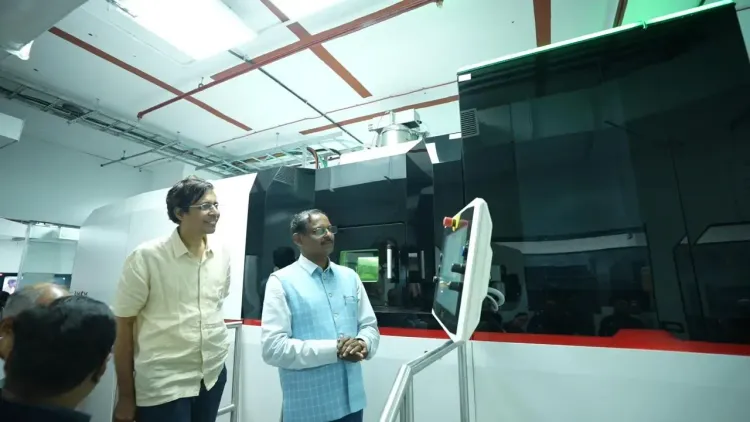Has Agnikul Launched India's First Additive Manufacturing Hub for Rockets?

Synopsis
Key Takeaways
- Agnikul Cosmos has launched India's first additive manufacturing facility for rockets.
- The LFAMM Unit will enable 3D printing of large aerospace components.
- Cost reductions of 50 percent in space technology manufacturing are anticipated.
- The facility supports a comprehensive ecosystem for aerospace production.
- Agnikul aims to make space accessible and advance rocket manufacturing quality.
New Delhi, Sep 23 (NationPress) In a significant move towards achieving an Atmanirbhar Bharat in space technology, the Indian space-tech company Agnikul Cosmos has unveiled a pioneering additive manufacturing facility. The Large Format Additive Metal Manufacturing (LFAMM) Unit is specifically tailored for aerospace and rocket systems, marking the first instance in India where 3D printing of aerospace and rocket components up to one meter in height is possible.
The inauguration ceremony featured notable figures including Dr. V. Narayanan, Secretary of the Department of Space and Chairman of ISRO, and Prof. V. Kamakoti, Director of IIT Madras, among others. This facility introduces a comprehensive ecosystem that encompasses design, simulation, printing, post-processing, and finishing, which will significantly improve quality, reliability, and resilience of the supply chain, while simultaneously reducing space manufacturing costs by 50 percent.
“We inaugurated our advanced Large Format Additive Metal Manufacturing (LFAMM) Unit -- a milestone for an Atmanirbhar Bharat in space technology,” Agnikul announced on the social media platform X.
“This facility includes: India’s largest 3D metal printer for extensive space-tech systems -- an indigenous de-powdering machine engineered and constructed in-house for consistent post-processing … and much more,” they elaborated.
Thanks to the LFAMM Unit, Agnikul can now provide fully finished, flight-ready hardware within a matter of days.
“Agnikul was founded with the vision of making space accessible to everyone. One approach to achieve this is by developing capabilities that enhance precision in rocket manufacturing, while prioritizing quality,” stated Srinath Ravichandran, co-founder and CEO of Agnikul Cosmos.
“By not only enhancing our printing capacity but also developing full-scale machines internally, we are positioning ourselves to accelerate the production of space transportation systems, drawing us closer to delivering Agnikul’s innovations and our clients to space,” he added.
In 2024, Agnikul also made headlines by launching the world’s first rocket featuring a single-piece three-dimensional (3D) printed engine.
The rocket Agnibaan SOrTeD (SubOrbital Technological Demonstrator) is India's inaugural semi-cryogenic engine-powered rocket, entirely designed and manufactured within the country.
This IIT Madras incubatee also holds a US patent for single-piece 3D-printed rocket engines.









